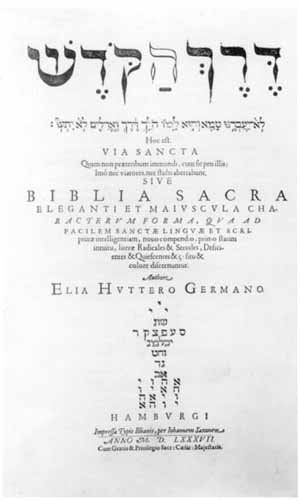

It was fun to find specific books, considering that they were needles in haystacks. (Okay, not really. After all, many of the interesting titles were places at least reasonably within eye level, and arranged by region of printing.)
Here is a title I was gratified to find (you can read this very edition here):

This is the 1728 edition of the Mikra'os Gedolos, the first produced by Jews, titled Kehilot Moshe. You can't tell from the photo just how large this edition is. The volumes are as large as a real chosson shas. This is the very edition Jean-Philip Baratier's father bought for him:

I found the Elijah Levita shelf:

Wessely:

And of course, Shadal:

From the manuscript room, the 12th century Samaritan Pentateuch:

It was a lot of fun to eavesdrop there, and to see the show-offs who tried to demonstrate that they could read it. You know who you are, people. You read it as well as a 5 year old reads Ashrei.
For some reason, R. Yitzchak Lampronti's 32-volume hand-written revision of the Pachad Yitzchak moved me more than almost anything. (Although I am unclear if it is in his own hand, or if this is by a copyist.)


Here is a detail of the 12th century English Pentateuch manuscript, which was one of the centerpieces of the collection:

A lot of people don't realize that one of the key medieval Hebrew grammarians and masoretic scholars lived in England: משה הנקדן (albeit, he was born after the above codex was written).
The following Franco-German (ie, Ashkenazic) codex was quite fascinating from a historical perspective, being that it is dated to the 10th or 11th century, making it quite possibly (even likely) older than Rashi himself. Not bad to see a Chumash from Rashi's region that predates him!

Here is simplicity and beauty; a private 18th century Italian translation of Daniel:

I'm not one of those people who get excited about Incunabula (at least not more so than printed books from after that arbitrary demarcation line, 1500). But it was fun to see so many of them all at once.
I couldn't believe the pristine condition of this edition of Yosippon (Gorionides; Pseudo-Josephus):

It was over 500 years old, and for all intents it looked like a fascimile printed on fine paper last week.
Everyone is interested in the censor's black ink, and here is one:

(If you enlarge the image, you can read the censored text through the ink. What's particulary fascinating is how the words meaning "God" and "godliness" were spared the ink by the censor.)
Moving on to the not-entirely-accurately-title "Reading Room":
God save the Ashkenazim!

Unfortunately I did not get a clear picture of the Hutter Bible, but it was exciting for me to see it.

Elias Hutter came up with a brilliant idea, and printed a Hebrew Bible with his innovation, which consisted of using two fonts. One was normal, and the other had a hollowed-out appearance. He printedeach word using these two fonts; the radical letters (שורש) in the normal font and the servile letters in the hollow font. In this way, the root of each Hebrew word could clearly be identified.
Since my picture is so poor, here is the title page from the edition in the Library of Congress:

As you can see, the ה in the words דרך הקדש is hollow, for it is not part of the root.
Unfortunately my camera ran out of power and I was unable to get a photo of an interesting book from the 16th century; a book of haftarot, with Yiddish translation (albeit at that time the speakers of that language did not call it Yiddish; they called it טויטש, evidently because that is what they believed themselves to be speaking; Deutsche, ie, German.
What was interesting to me was the word haftaros, which was incorrectly spelled (in square script) הפטורה. This was wonderful, because the explanation is most likely that the pronunciation of the קמץ among Ashkenazim at the time was very, very close to חולם וי"ו, hence the confusion. Indeed, to this day many pronounce haftarah as if it were haftorah, and even haftoyrah, albeit probably because of the phonetic similarity to the word Torah.
You've got your congratulations-you-are-now-a-physician poem in honor of the son of R. Yitzchok Lampronti.

Your here's-Shabbesai-Zvi-and-his-prophet announcement in Dutch:

Future post to follow.

No comments:
Post a Comment